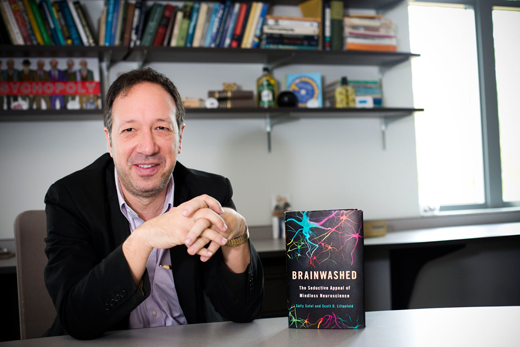Psychology professor Scott Lilienfeld wants us to know that neuroscience is not a magic pill, not a cure-all, and not an easy and flawless way to get into people's minds or predict behavior. He makes the case for a more cautious look at neuroscience in his new book "Brainwashed: The Seductive Appeal of Mindless Neuroscience" (Basic Books, 2013), co-authored with psychiatrist Sally Satel.
Lilienfeld talks with Emory Report about his latest scholarship:
How would you summarize this book in one sentence?
This book is a critical examination of what we call neurocentrism, the assumption that the brain is necessarily the most important level of analysis for understanding human nature.
What sparked your interest in this topic?
I was becoming concerned that the fields of psychology and psychiatry were becoming too focused on just one level of analysis — namely the brain. Neuroscience is a very important and useful approach to human behavior, but it has its limits. For certain kinds of problems, such as the cause of poverty or marital strife, other levels of analysis — psychological, social and cultural — are equally or more important. We were concerned they are being neglected. In some domains it's becoming hard to get grant funding unless one includes biological indicators.
In researching this book, what unexpected discoveries did you make along the way?
The extent of resistance to some of the criticisms [of neuroscience]. There have been criticisms of some of the methodologies of brain imaging, and even though brain imaging is fancy – which it is – and an advanced tool — which it is — some of the research methods that were being used weren't up to snuff. Fortunately, I think the critics have prevailed and the field has started to pay attention to their caveats.
What's changed?
The fact that the criticisms were right [laughs]. Researchers started to realize these criticisms were legitimate. There was a sense that 'wow, this is really impressive technology,' it may be partly immune from the kinds of problems that plague other psychological techniques. But it's not. For example, if you have small sample sizes your data are more likely to yield fluky results – regardless of the kind of research.
What do you think will most surprise readers about your book?
Some people may assume that looking at the brain is inherently more useful than talking to people when it comes to inferring their motives. But we argue that in a lot of cases the neurological level of explanation doesn't really buy us anything more than you learn from talking to people.
What kind of impact do you hope this book has?
The media has very often made over-expansive claims about what brain imaging can tell us — articles that say neuroimaging can tell us about political views, that it can predict violence with high levels of certainty, that it can predict voting preferences. Many of these claims go well beyond the data. My hope is that this book will result in more humility in terms of what neuroscience can accomplish.
Faculty author spotlights
The Emory Report Book|Report series features interviews with faculty authors. Explore more.

